Civil Liberties, Criminalizing Dissent, Human Rights, Political Prisoner, Supreme Court, War Resister
Podcast: Play in new window | Download
Updates:
- Maryland Law Allows Police To Collect DNA During Arrests
- Heidi Boghosian: National Lawyers Guild Monitoring RNC / DNC Demonstrations
- In Memory: Michael Nash
- In Memory: Alexander Cockburn
- In Memory: Professor John (Tito) Gerassi
- You Have The Right To Remain Silent Booklet
———–
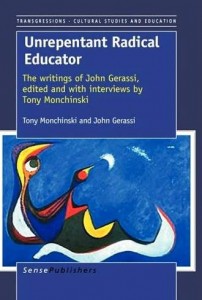
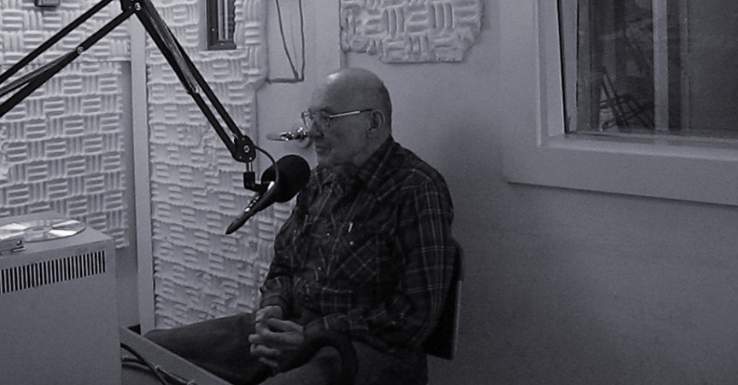
Unrepentant Radical Educator: The Writings of John Gerassi
Professor John (Tito) Gerassi, once an editor at Time magazine, then at Newsweek. He obtained his PhD at the London School of Economics and Political Science. He was a long time civil rights and anti-war militant and author / editor of ten books plus scores of articles and pamphlets published on both sides of the Atlantic. He was Professor of Political Science at the City University of New York. Professor Gerassi discussed his book, Unrepentant Radical Educator: The writings of John Gerassi, edited and with interviews by Tony Monchinski (Transgressions: Cultural Studies and Education) Indypendent Book Review
The book joins personal narratives from Gerassi’s days of journalism and activism, featuring Che Guevara, Fidel Castro, Jerry Rubin, Eldridge Cleaver and others of the era, with essays on figures such as Sartre, Camus, and Julius and Ethel Rosenberg. One review writes, (Especially fascinating are the tales of deliberate misreporting by the major media outlets for which he worked, epitomized by the words of owner Henry Luce when Gerassi was hired: “We here at Time believe that objectivity is neither feasible nor desirable.”)
John “Tito” Gerassi:
- Time Magazine: I hear you’re coming aboard Mr. Gerassi. In the long run, it was great that I got kicked out
- Met Che Guevara in Uruguay, as a journalist for the New York Times, there was a fight with anti-Castro students, the police were scared, one man fired his gun in the air, it ricocheted and hit and killed a USIS Cuban.
- Che told me I don’t talk to the imperialist press. At the hotel, they had reserved a large table where all the left-wing characters sat around with Che. Argentines say chez vous, that’s how Che got his nickname Che.
- The Great Fear in Latin America – John Gerassi
- Che Where Are You? Eventually there will be many Che’s.
Guest – Professor John Gerassi, once an editor at Time magazine, then at Newsweek, who obtained his PhD at LSE, is a long time civil rights and anti-war militant. He is the author or editor of ten books and scores of articles and pamphlets published on both sides of the Atlantic. He is currently Professor of Political Science at the City University of New York.
——————————————————
Civil Liberties, Habeas Corpus, Human Rights, Surveillance
Podcast: Play in new window | Download
Updates:
—
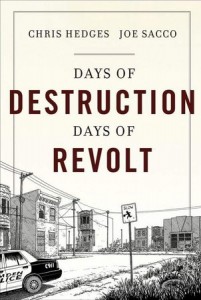
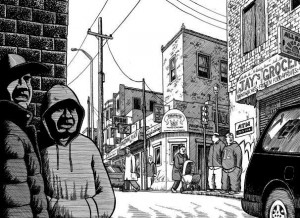
Days of Destruction Days of Revolt – Chris Hedges
We go now to an interview with Pulitzer-Prize winning author and journalist Chris Hedges. His latest book Days of Destruction Days of Revolt sends a powerful message about the perils of staying on the current destructive track in post capitalist America. The book is also filled with line drawing graphics, illustrating some of the most depraved areas in the United States. The book explores what Chris describes as the country’s sacrifice zones, areas that have been torn apart in the name of greed, progress and technological advancment. These areas include the streets of Camden New Jersey, the coal fields of West Virgina, the Lakota reservation of Pine Ridge in South Dakota. This interview was recorded live during a WBAI fund raiser.
Chris Hedges:
- One of my frustrations is the people who keep plowing back their hopes into the democratic party and the formal structures of power. If you challenge the approved narrative (political debates) you’re out.
- When you look at the structures of power and you grasp what we’ve undergone is a corporate coup de tat in slow motion, starting with the Reagan Administration.
- It’s utterly impossible within the system to vote against the interest of Goldman Sachs.
- Karl Marx: his analysis of capitalism is pretty remarkable.
- They understand that unfettered, unregulated capitalism is a revolutionary force. It knows no limits. It will commodify everything until it destroys it – until exhaustion or collapse.
- Since there are no impediments within the mechanisms of power to disrupt essentially a corporate cannibalization then the only thing to impede that is popular unrest.
- Book – Anatomy of Revolution
- What they (Occupy Movement) fundamentally wanted was something the power elite couldn’t hear.
- They wanted to rest power back from the hands of a corporate oligarchy class and put back in the hands of citizens.
- A democratic administration was behind a coordinated federal effort to shutdown the Occupy Encampment.
- When Marx and Engels did their work they did a very close study of the Iroquois in how they governed themselves and functioned as a society.
- We begin with an indigenous culture essentially about breaking a culture replacing a self sufficiency and dignity with a culture of dependence.
- What that engenders is this horrific despair that consumes to this day in indigenous communities.
- The average expectancy for males in Pine Ridge is 48. That’s the lowest in the Western hemisphere except for Haiti.
- We are fed this utopian ideology that if somehow we build our culture and society around the demands of the marketplace we’ll get some sort of utopian heaven on Earth.
- We didn’t want a book of polemics, you couldn’t argue with what’s taken place.
- Immokalee becomes emblematic with what the corporate state wants.
- Workers are told they have to be competitive in a global market place which means being competitive with sweat shop workers in Bangladesh.
- It’s only through acts of disobedience and civil resistance that we have any hope.
- The decision to completely erase the Occupy Encampment exposed their hand.
- There is a backlash outside the traditional mechanisms of power.
- Hundreds of thousands of Americans have lost their unemployment benefits.
Guest – Chris Hedges, Pulitzer-Prize winning author and journalist. He was also a war correspondent, specializing in American and Middle Eastern politics and societies. His most recent book is ‘Death of the Liberal Class (2010). Hedges is also known as the best-selling author of War is a Force That Gives Us Meaning (2002), which was a finalist for the National Book Critics Circle Award for Nonfiction.
—
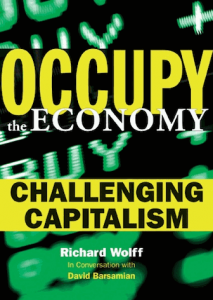

Occupy the Economy: Challenging Capitalism PART 2
Occupy the Economy: Challenging Capitalism is the title of Professor Rick Wolff’s new book. After more than a dozen interviews with Rick Wolff since 2008, the theme is consistent, beyond the corrupt banks and stock markets is a flawed economic system. A system that at worst needed to change direction in the 1970s when wages stopped increasing and the cost of living continued to rise. As we look around, the collapse has been coming down in steps, and many have been trying to dial back, save and prepare. This, as millions have lost their jobs, 401ks, pensions, and homes. Overseas, the waves of austerity continue to push through Europe as protests have erupted again in Spain.
Professor Rick Wolff:
- The book is an interesting venture for me, it’s done with David Barsamian, with Alternative Radio.
- He did 3 major interviews with me, the response was so heartwarming, we published a written version of them.
- The book is an overview of how we got into this mess, why it’s lasting so long, why it’s hurting so badly, why government policies have in fact, not succeeded.
- A number of the economies in Europe are on the edge of major breakdown. Spain is already in that situation, Italy is right on its heels. This is not like Greece or Portugal, Ireland or Hungary who are smaller economies, these are major economies.
- There is active debate in the highest circles of Europe, both critics of capitalism and its leaders, questioning whether the European Union can survive . . its a measure of how serious the problem is.
- China, by its own announcing running at a rate of growth of 7- 8 percent which is half of what it had very few years ago.
- It can’t also escape the effect of Europe which is its second most important market.
- China is trying to reorient the economy away from their dependence from exports to the rest of the world because frankly that’s not a reliable situation for them. To give you one index.
- As wages in the United States stagnated, wages in China have gone up 20 percent.
- The slow downs in India, very sharp. The slow downs in Brazil, very sharp.
- The consensus is what Bernanke said. Things are very poor, very weak and we really have to be alert.
- The situation is only going to deteriorate over the rest of 2012 and into early 2013.
- When a capitalistic economic system begins to unravel. . . we’re in the fifth year of this crisis. It officially began in December 2007.
- Every major government program, the bailouts, the stimulus has not achieved the goals it said it could and would.
- The biggest capitalist institutions in this country at this time, the banks. . .are in such trouble are so worried about their own prospects in an economy in such difficulty that what they are doing is taking excessive risks, pushing the envelope of what’s ethical and moral and crossing the thin and blurry lines of legality.
- LIBOR – London Interbank Offered Rate – Starting in the 1980s, London which had been the financial center of the world economy realized what we all understood at that time which was the world economy was becoming dependent on credit.
- Every corporation was borrowing money all the time, every government was borrowing money on a scale we’ve never seen before, the really innovative thing was the development of consumer credit.
- The LIBOR became the benchmark for the world.
- Everyday the British Bankers Association polls the 16 biggest banks who have offices in England, what they are charging each other.
- It takes an average and it announces that. That number is a standard number for example, variable rate mortgages in the US where the mortgage goes up and down those are based on LIBOR.
- It’s factored into everybody’s borrowing. If you’re going into store to buy a pair of pants, that store also borrowed money which is also shaped by a relationship to LIBOR.
- These banks are the biggest holders of debt instruments. Derivatives of all kinds, mortgages of all kinds. You are relying on information from somebody who has an active interest in the information they’re supplying.
- What we now know is these banks often reported an interest rate different from what they were actually charging.
- There was no oversight.
- The world of superbanking is a very cozy world. Barclay’s had admitted to reporting a number that was actually the case. . . and had paid fines now totalling 450 million dollars to both US and British authorities.
- To be blunt they screwed everybody to save themselves.
- How could we defend private banking on this scale ever again?
- The big ones are Bank America and Wells Fargo.
- Both of them have both agreed to pay fines. Bank of America – 300 million. Wells Fargo 175 million.
- Here was what their fine was for. They went and charged African American and Hispanic families more interest for mortgages than they did for whites who had identical credit scores.
- Five of the biggest banks in the world Barclays, Wells Fargo, HSBC, and JP Morgan Chase have all admitted major breaches of minimal ethics, minimal morality, legality all to advantage themselves at the expense of the public.
- Private monster banks are an unsafe way for any society to manage the credit that has now become central to the economy. It is inappropriate for us to have banks that have more money than the government supposedly regulating them.
Guest – Richard D. Wolff is Professor of Economics Emeritus, University of Massachusetts, Amherst where he taught economics from 1973 to 2008. He is currently a Visiting Professor in the Graduate Program in International Affairs of the New School University, New York City. He also teaches classes regularly at the Brecht Forum in Manhattan.
CIA Sponsored Terror, Civil Liberties, Criminalizing Dissent, Habeas Corpus, Human Rights, Political Prisoner, Prison Industry, Surveillance, Torture
Podcast: Play in new window | Download
Updates:
—
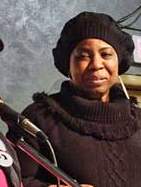
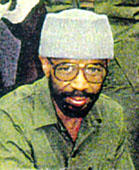
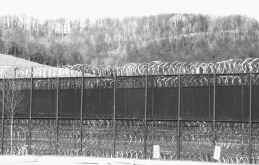
Campaign To Release Russell Shoatz From Solitary Confinement Into General Population
Last year, the National Lawyers Guild called on Superintendent Louis Folino to support the Program Review Board’s recommendation to release Russell Maroon Shoatz into the general prison population at SCI Greene in Waynesburg, Pennsylvania. As many listeners may know, Russell Maroon Shoatz has been held as a political prisoner under intense lockdown spending no more than one hour a day outside of his cell for the past 21 of those years. He was locked up in 1972 for his activity as a member of the Black Liberation Army. We follow up on the international campaign to release Shoatz. The effort was launched in New York City and London and sponsored by the Scientific Soul Sessions.
Theresa Shoatz:
- He goes before the Program Review Board every 90 days, its about 68 visits since he’s been in solitary confinement. He hasn’t had any infractions in 30 years.
- If you look at that, they don’t intend to release him into general population.
- It’s a check-off, how has response been around the guards? What’s your response when you’re taken to the shower?
- Russell had become disappointed with the Program Review Committee and said “I’m not going anymore.”
- I called the Program Review Committee at SCI Greene, and said we’re getting tired of this no-movement forward.
- They said they look down on that as not cooperating with the prison. We look at as they’re not cooperating with all the rules they set forth. There is a step down program, they don’t use it as much as they should.
- When you talk about holding one person in solitary confinement, he has to be transferred, whatever his movement, to the shower, to the one hour cage, it takes two guards.
- SCI Greene released at least 20 prisoners from solitary confinement who they had no intention of releasing but because the state budget is in jeopardy now.
- They left Daddy back there. Daddy’s approaching 70 years of age, he hasn’t had an infraction in 30 years, you would’ve thought he’d be the perfect person for this step down program, and we questioned that.
- When I talk to the staff in solitary confinement, they all say he needs to be general population.
- Superintendent Folino retires in 2 years and I think he may want to slide out without releasing him into population.
- Russell escaped in 1977, in the 80s, he was in population at SCI Pittsburgh.
- He had been voted the first black president of the Lifers Association.
- Folino states that he is a leader and he is to remain in solitary. The director of the Program Review Committee actually stated that he is a leader. Obviously Theresa, you don’t know he’s a leader?
- Outside of him being a leader, he’s been able to withstand this 23 hour a day lockdown.
- I do see there are some changes with Russell. I’m talking emotionally, he’s very distraught now.
- I’m shocked that he hasn’t totally broken down.
- He gets a lot of mail. He’s busy with letter writing.
- I found there have been a lot of suicides in SCI Greene’s solitary confinement unit. Boys in their twenties hanging themselves. You don’t hear about it.
- This is torture. In 2005, there were 80 thousand people in solitary confinement.
- Juan Mendez’s report on Russell Maroon Shoatz
- My focus is on getting Maroon into population. I’m concerned with stopping the expansion of prisons being built. It costs millions of dollars to build new prisons, instead of using that for education for prisoners being released.
- Put that money back into public schools instead of building new prisons.
- We’re being assaulted by this present day prison system and our government nor our state seems to mind locking up folks or taking away money from our public school education and putting it into prisons.
- Congressional Hearing on Solitary Confinement
- hrcoalition.org / Russell Maroon Shoatz
Guest – Theresa Shoatz, a Philadelphia-based prison justice activist and the daughter of Russell Shoatz.
—–

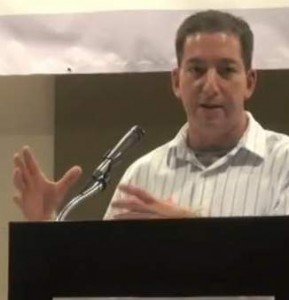
Glenn Greenwald: Challenging the Surveillance State, Breeding Conformists
Glenn Greenwald, author and contributor (columnist and blogger) to Salon.com. During his book tour for the release of With Liberty and Justice for Some, (paper back release) he gave a impactful speech in Chicago titled Challenging the Surveillance State.
—————————————
Civil Liberties, Human Rights
Podcast: Play in new window | Download
—-


ACLU Files Lawsuit For Second Parent Adoption
The American Civil Liberties Union and the ACLU of North Carolina Legal Foundation filed a lawsuit on behalf of six same-sex couples and their children seeking the right to obtain second parent adoptions for their children. What is a second parent adoption? That’s when one partner in an unmarried couple adopts the other partner’s biological or adoptive child. This can occur in both gay and straight relationships. In December 2010, the North Carolina Supreme Court banned second parent adoptions for same-sex couples.
Attorney Chris Brook:
- We brought it on behalf of six families here in North Carolina where one parent has parental rights and a legal relationship with their child or children that they’re raising and the other parent that is playing an equivalent role in raising the child that does not have a legal relationship. . . and is treated as a stranger by the law.
- The lawsuit seeks to make uniform adoption laws in North Carolina such that they focus exclusively in what’s the best interest for the child.
- Each of the families in the lawsuit have a compelling story to tell.
- It just makes a lot of sense for the parents to provide care then for the child to be a ward of the state.
- It (the state law) does apply to unmarried couples whether they are gay or straight.
- The reason why all six of the parents involved are gay couples is because in North Carolina there is at least a remedy to unmarried straight couples. They could always get married and rectify the problems.
- This litigation is being brought on behalf of same sex couples here.
- My understanding is that 20 states including the District of Columbia permit second parent adoption.
- If there’s not a legal relationship with the second parent and the child, they may not be able to get health insurance through that parent. Similarly for worker compensation benefits.
Guest – Attorney Chris Brook, Legal Director with the ACLU of North Carolina
—-
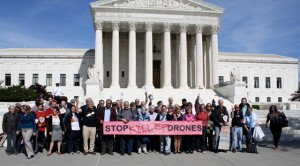
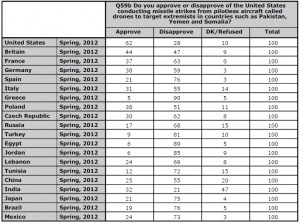
Drone Summit: Killing and Spying by Remote Control
Earlier this year, human rights advocates, robotics technology experts, lawyers, journalists and activists gathered to bring detailed up to date information about the widespread and rapidly expanding deployment of both lethal and surveillance drones, including drone use in the United States. We hear excerpts of 2 presentations delivered at the drone conference in Washington DC titled Drone Summit: Killing and Spying by Remote Control.
Medea Benjamin , co-founder of the human rights group Global Exchange and the peace group CODEPINK. She’s also the author of the new book Drone Warfare: Killing by Remote Control. It’s a comprehensive look at the growing menace of drone warfare, with analysis of who is producing the drones, where they are being used, and who pilots the unmanned planes.
Trevor Timm, activist at the Electronic Frontier Foundation, who specializes in free speech issues and government transparency.
—-
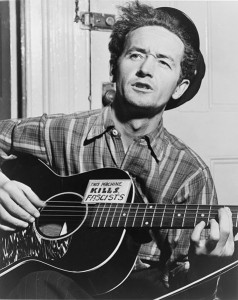
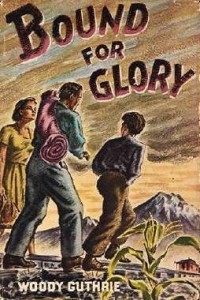

Woody Guthrie – 100th Centennial Celebration
Woodrow Wilson Guthrie was born on July 14, 1912, in Okemah, Oklahoma. Music festivals around the country mark his centennial. Many know Woody Guthrie by the song, “This Land Is Your Land” but he recorded much more and the bulk of those songs are archived in the Library of Congress. Woody was very productive, he was a writer, a cartoonist, and a biographer. “Roots of Woody Guthrie: Celebrating Woody at 100” Down Home Radio Show
Eli Smith:
- He was born on July 14, Bastille Day. He moved to Brooklyn in 1940. He was a radical guy, a socialist. His father was a successful business man in Oklahoma during the boom times.
- He had grown up in a stable middle class family. His mother suffered from Huntington disease which killed Woody Guthrie in 1967 at the age of 55.
- Woody Guthrie did travel with migrant workers, of course there were hundreds of thousands of migrants riding the rails.
- In California, Woody started his career also as a radio personality, he was already writing and painting, he was a multi-faceted artist.
- Woody loved Will Rogers, another Oklahoman, he was a Native American and stand up comic.
- Not only was he (Woody) a writer and performer of songs, he also wrote poetry and prose and newspaper opinion pieces.
- He was also a talented painter and visual artist.
- His autobiographical novel, Bound for Glory was published in 1943.
- Woody Guthrie had 8 children over the course of his life. He did several albums of children’s songs for the Folkways Records.
- He composed This Land Is Your Land to a response to that song (God Bless America)
- Since that time its been sanitized because they took out the more communistic verses, it’s kind of a second national anthem.
- “Roots of Woody Guthrie: Celebrating Woody at 100” Down Home Radio Show
Guest – Eli Smith (host/producer) is a banjo player, writer, researcher and promoter of folk music living in New York City. Eli is a Smithsonian Folkways recording artist. Eli organizes two folk festivals annually, the Brooklyn Folk Festival in the Spring and Washington Square Park Folk Festival in the Fall.
——————————-
Civil Liberties, Criminalizing Dissent, FBI Intrusion, Habeas Corpus, Human Rights, Prosecution of the Bush Administration, Targeting Muslims, Torture, Truth to Power, War Resister
Podcast: Play in new window | Download
Updates:
—–
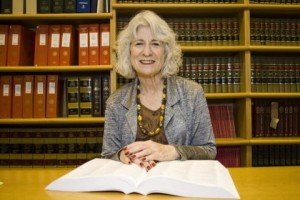

Lawyers You’ll Like: Attorney Nancy Hollander
In this week’s Lawyers You’ll Like series, we’re joined by attorney Nancy Hollander. Nancy has been a member and partner with Freedman Boyd Hollander Goldberg Ives & Duncan P.A. since the early 80s. Her practice is devoted to mostly criminal cases including those involved with national security. Ms. Hollander has also argued and won a religious freedom case in the US Supreme Court. She’s served as a consultant to the defense in a high profile terrorism case in Ireland – and she represents 2 prisoners at Guantanamo Bay Naval Base.
Attorney Nancy Hollander:
- I was a community organizer with JOIN, Jobs or income now.
- We organized Appalachian migrants to Chicago. I wrote a book that I co-authored with Todd Gitlin called Uptown.
- I became a photographer, I learned how to develop film in the basement of Jessie Jackson’s church. I was in Cleveland for a time and then came to New Mexico, became the Executive Director of the New Mexico Civil Liberties Union, then went to law school.
- I worked as a riveter in a football equipment factory.
- It looked like that whole began when I met with Vietnamese women in Indonesia 1964. I met with women from North and South Vietnam.
- We all met at the embassy, and I thought, that was odd meeting, and that was the beginning of my CIA file.
- I represent 2 people (in Guantanamo Prison) one is Mohamado Ould Slahi, he’s a Mauratanian citizen, he was there from almost the beginning.
- We won his habeas case, the judge ordered him almost immediately released.
- After ten years, the government said they didn’t have the preponderance of evidence to keep him.
- The government appealed, the case got remanded, and we’re essentially starting over.
- They changed what they accused him of continuously. He’s never been tried, he was tortured.
- The rule of law has become the law of changing rules.
- I got a security clearance and learned about SEPA and OFAC, the Office Of Foreign Asset Controls.
- We originally represented the Holy Land Foundation in its fight against the designated and some other civil litigation.
- They were charged and convicted of providing charity.
- The law is very fluid and lawyers have a lot of power. Our power is to make change and to create miracles in some cases. There have been something like 100 terrorism cases tried in New York alone since 9/11
Guest – Attorney Nancy Hollander has been a member of the firm Freedman Boyd Hollander Goldberg Ives & Duncan, P.A. since 1980 and a partner since 1983. Her practice is largely devoted to criminal cases, including those involving national security issues. She has also been counsel in numerous civil cases, forfeitures and administrative hearings, and has argued and won a case involving religious freedom in the United States Supreme Court. (see decision) Ms. Hollander also served as a consultant to the defense in a high profile terrorism case in Ireland, has assisted counsel in other international cases and represents two prisoners at Guantanamo Bay Naval Base. Nancy is co-author of WestGroup’s Everytrial Criminal Defense Resource Book, Wharton’s Criminal Evidence, 15th Edition, and Wharton’s Criminal Procedure, 14th Edition. She has appeared on national television programs as PBS Now, Burden of Proof, the Today Show, Oprah Winfrey, CourtTV, and the MacNeill/Lehrer News Hour.
—–
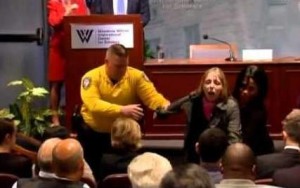
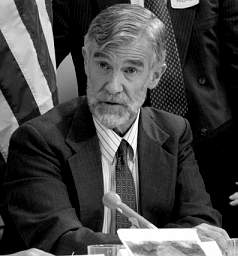
The Moral Challenge of ‘Kill Lists’ by Ray McGovern
The Obama Administration has conducted hundreds of drone strikes in several countries, killing civilians and a US citizen. Critics point out that as the Obama Administration assassinates its’ suspects, it also avoids the legal complications of detention. In last week’s New York Times, authors Jo Becker and Scott Shane expose the priest-like role of counter terrorist adviser John Brennan as he provides Mr. Obama with the moral justification for extrajudicial murder. The framing of John Brennan’s role of priestly adviser caught Ray McGovern’s attention. His recent article The Moral Challenge of Kill Lists, dissects the New York Times story.
Ray McGovern:
- There has been a geometric increase in the number of drone strikes against Pakistan and of course Somalia and Yemen.
- London based bureau for investigative journalism estimates that about 830 civilians including women and children may have been killed by drone attacks in Pakistan. 138 in Yemen, and 57 in Somalia. It’s incredibly naive to think that this helps in any way in the war on terrorism.
- This wonderfully insightful and dangerous New York Times article a week ago talked about the conundrum of aligning these activities with US legal and moral principles. Conundrum? That’s an impossibility.
- The Fifth Amendment prevents this sort of thing if you take the interpretation we’ve always had.
- As the New York Times article mentions 1 out of 30 assassinations that are known about just one escaped assassination and was brought before a court. It’s much easier to kill them.
- If you wanted to learn about al-Qaeda, don’t you think Osama Bin Laden could’ve told us some stuff about al-Qaeda?
- Any military aged male in the area of a “bad guy” is fair game.
- Maybe I can draw from my own experience in the CIA, I know about lists. I know that when there was a coup attempt in Indonesia in 1965, that there were lists given to the Indonesian authorities of communists. How many communists on that list? A million. How many were killed, were murdered? 500 thousand plus. How many were put in prison? The other 500 thousand.
- The drones are really accurate but the target information is notoriously inaccurate.
- I love Fordham and I hate to see the administration and the very wealthy trustees who have lots of money to give to Fordham, determine who comes in to give the commencement address.
- I think that you have to have some kind of personal involvement with innocent suffering. I think that you have to have some sense of the injustice others suffer to let your heart be touched by this direct experience.
- Obama’s fallen in with a rough crowd.
- I was attracted to getting outside of my Catholic walls. There’s a small church down in Washington DC called the Church of the Savior.
- I found out they were doing wonderful things like preventing housing from being gentrified so poor people can still live there. Healthcare, jobs, addictions, a hospice for people to sick to be on the street.
- There’s been one major change for the good in this country. That is Occupy.
- When you look for proof that Occupy has incredible potential, look no farther than what the president and the top senators thought necessary to inject into the NDAA on New Year’s Eve, which allows them to use the US Army of all things to wrap us all up without charge, without court proceedings.
Guest – Raymond L. McGovern, retired CIA officer turned political activist. McGovern was a Federal employee under seven U.S. presidents in the past 27 years. Ray’s opinion pieces have appeared in many leading newspapers here and abroad. His website writings are posted first on consortiumnews.com, and are usually carried on other websites as well. He has debated at the Oxford Forum and appeared on Charlie Rose, The Newshour, CNN, and numerous other TV & radio programs and documentaries. Ray has lectured to a wide variety of audiences here and abroad. Ray studied theology and philosophy (as well as his major, Russian) at Fordham University, from which he holds two degrees. He also holds a Certificate in Theological Studies from Georgetown University. A Catholic, Mr. McGovern has been worshipping for over a decade with the ecumenical Church of the Saviour and teaching at its Servant Leadership School. He was co-director of the school from 1998 to 2004. Ray came from his native New York to Washington in the early Sixties as an Army infantry/intelligence officer and then served as a CIA analyst from the administration of John F. Kennedy to that of George H. W. Bush. Ray’s duties included chairing National Intelligence Estimates and preparing the President’s Daily Brief, which he briefed one-on-one to President Ronald Reagan’s most senior national security advisers from 1981 to 1985.
—————————————————————————–




















